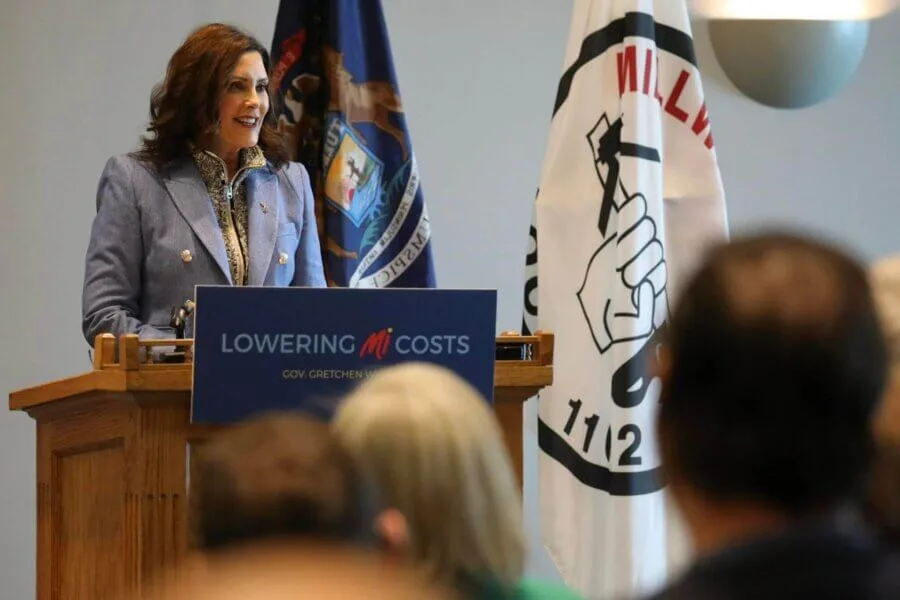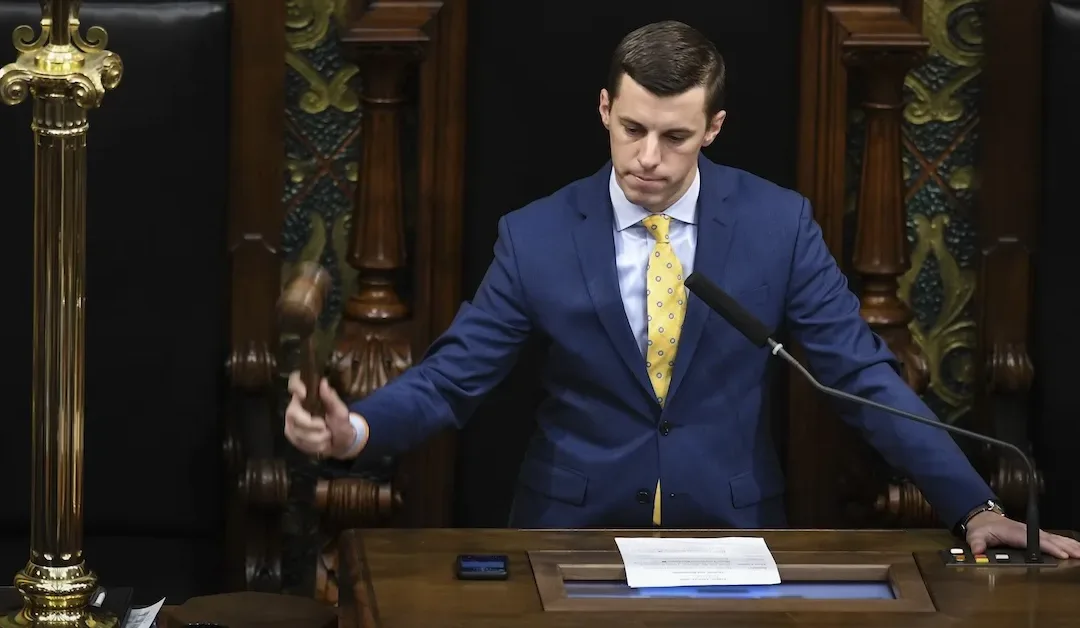
Gov. Gretchen Whitmer has pledged to deliver on the issues that make a real difference in Michiganders' lives—including by lowering their costs, and building a stronger economy. (Courtesy/Governor Gretchen Whitmer via Facebook)
LANSING—More than 2.4 million Michiganders voted to re-elect Gov. Gretchen Whitmer to another four-year term in November, a move that’ll keep her behind the governor’s desk through 2026. And this month officially marks the completion of the first 50 days of her second term.
Over the last several weeks, Michiganders have seen the creation and support of thousands of new jobs, progress on a lengthy list of road repairs, lowered costs for families pinched by inflation, and continued efforts to make the state a safer place to live, work and attend school.
Here are four takeaways from the first seven weeks (and one day) of Whitmer’s second term:
1. Michigan’s economy is still growing.
In early January, Whitmer announced funding for construction and improvements on nearly 700 affordable housing units from Cheboygan to Detroit—creating more than 60 permanent jobs, as well as 1,100 construction jobs. Later that month, she announced a $25 million investment by L&L Products in Romeo, which is set to create 65 advanced manufacturing jobs. And this month, Michigan scored a $3.5 billion investment from Ford that’ll create another 2,500 jobs.
“All these investments will expand opportunity and drive Michigan forward,” Whitmer said.
Working with a $9 billion budget surplus from her first term, Whitmer’s latest budget proposal also aims to streamline economic development funding and entice more big-name companies to expand their business operations in Michigan—much like Home Depot announced last week.
READ MORE: More Big-Name Companies Plant Roots in Michigan
2. The damn roads (and more) are still getting fixed.
Whitmer has been focused on “fixing the damn roads”—as well as the state’s bridges, pipes, housing and all other kinds of infrastructure—since she took office. This year is no exception.
In January, Whitmer signed an executive order to streamline housing funding and get dirt moving on several projects—and then she backed it up by signing a $1 billion supplemental budget that invests in affordable housing as well as support for the state’s small businesses. It was the earliest bill signed into law by a Michigan governor during a new term since 1947.
This month, Whitmer announced more plans to continue fixing the roads while also improving the state’s bridges and rail transit infrastructure. The proposal also involves replacing old lead service lines and continuing the state’s transition away from fossil fuels toward clean energy.
READ MORE: Counties, Cities and Townships Rejoice at Proposed Funding Boost
3. Lowering costs for families is still a top priority.
Democrats took control of the state House and Senate for the first time since the 80s—and Whitmer has wasted no time in putting that newfound legislative expediency to work.
In January, Whitmer announced the three-tiered “Lowering MI Costs” plan to roll back the retirement tax, quintuple the Working Families Tax Credit, and deliver $180 relief checks to every tax filer. All three initiatives were designed to put money back into Michiganders’ pockets.
READ MORE: Tax Cut Bill Passes Michigan Senate Without GOP Support
And this month, Whitmer’s latest budget proposal includes tax credits for childcare and preschool teachers, a temporary pause on sales tax for electric vehicles, and investments in the state’s Great Start Readiness Program which are designed to lead to free preschool programs.
READ MORE: Whitmer Budget Plan Prioritizes Tax Cuts and School Funding
4. Tragedy motivates more public safety investments—and gun reform.
In the wake of the deadly mass shooting at Michigan State University, Whitmer has thrown her support behind several common-sense gun safety proposals from the state Legislature—and she’s now “looking forward” to signing the bills into law if and when they make it to her desk.
Bills for universal background checks, safe storage laws and extreme risk protections orders are making their way through the Legislature. In the meantime, Whitmer’s latest budget includes an extra $500 million for public safety programs—like violence intervention initiatives to address the root cause of violence, and dedicated resources to train and retain local first responders.
READ MORE: Michigan Lawmakers Vow Action After Mass Shooting at MSU
Politics

Trump says he’s pro-worker. His record says otherwise.
During his time on the campaign trail, Donald Trump has sought to refashion his record and image as being a pro-worker candidate—one that wants to...

Former Michigan House leader and wife charged with financial crimes for misuse of political funds
LANSING—Prosecutors charged the former leader of the Michigan House and his wife with financial crimes Tuesday, alleging they milked political...

Thousands of workers rush to ‘make it in Michigan’ as clean energy jobs multiply
The Biden administration is investing billions of dollars in clean energy and creating thousands of new jobs. And in Michigan, workers are starting...
Local News

Michigan gets 3 years of probation for football recruiting violations; case vs. Jim Harbaugh pending
Michigan was given three years of probation, fined and hit with recruiting limits by the NCAA on Tuesday after football coaches and staff had...

Why Michigan State Police are about to destroy 3,000 guns in Flint
FLINT—The city of Flint is reporting a downward trend in crime rates, attributable in part to efforts by the city to remove guns from circulation....






